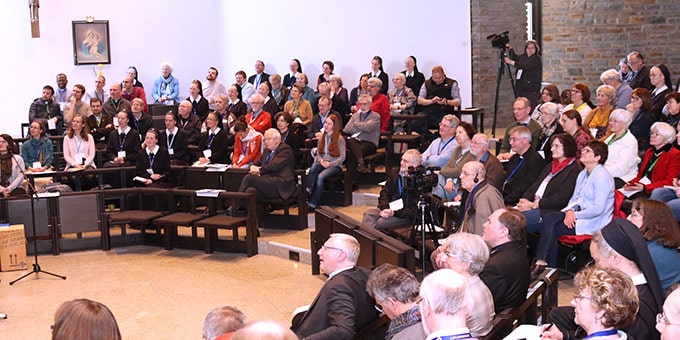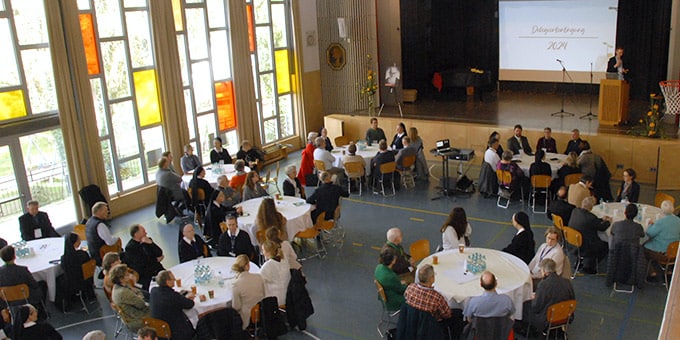National Delegates’ Conference in Germany
From March 1st to the 3rd, the Delegates’ Conference with the theme “Charism” took place in Schoenstatt, Germany. More than 150 delegates of the Movement from the various dioceses of the country and from different projects, initiatives and communities participated. Its objective was to come together as a community to determine the path to follow as a Movement for this year.
Sharing charisms
On the morning of March 1st, a meeting took place with different charisms that collaborate, along with the Schoenstatt Movement, with the initiative “Together for Europe”. In addition to some Schoenstatters who participate in Together for Europe, Fadi Krikor, founder of Father’s House for all the Nations, from Altenhohenau, and Herbert Lauenroth, of the Focolare Movement, from Ottmaring, participated in the meeting. The meeting allowed the delegates to experience the richness of their charisms and to deepen the basis for further reflection on Schoenstatt’s own charism.
Charism and growth
In the afternoon of the first day, the theme revolved around charism and growth. Prof. Em. Dr. Julius Kuhl spoke about spirituality and self-development within the context of the PSI (Personality-System-Interaction) theory which he has developed. Father Hans-Martin Samietz, Isch, then provided inspiration in his presentation on how the idea of the capital of grace can be reread and brought to life. Two testimonies followed on how the encounter with Schoenstatt forms a credible personality and may have a salvific effect in existential crises of faith.
The idea is that these presentations will help “to look at the inner processes of our spirituality, to search for the sources that help us live within the challenges of our times, instead of just describing the problems,” according to Father Güthlein, Director of the Movement in Germany.
The common renewal of the Covenant of Love, in the afternoon, went deeper into this, especially through the life testimonies of the Schoenstatt heroes.
Charism in contradiction
The topic of the morning of March the 2nd revolved around “Charism in contradiction”. Members of various research teams reported on their work on the Kentenich cause:
Heinrich Brehm, Press Office Director for the Schoenstatt Movement in Germany, gave an overview of the edition of the study series “Documents on the History of the Schoenstatt Movement,” which the team is conducting guided by the postulator of the cause for the canonization of Fr. Kentenich, Fr. Eduardo Aguirre, ISch. Three study editions have already been published, making five volumes in all. Two further study editions, also with a total of five volumes, are currently in preparation. With the help of this extensive archival material, the reader will be able to form his or her own opinion on the historical events.
Prof. Dr. Hubertus Brantzen is a key member of the postulator’s team responsible for compiling and presenting the documents. Based on his extensive studies, he makes it clear that the thesis put forward in the accusations against Kentenich claiming that he was sent into exile because of abuse is untenable. In the investigation, which now covers a large number of documents, no evidence of abuse was found anywhere.

As a member of the international research team convened by Schoenstatt’s General Presidium, Prof. Dr. Joachim Söder reports on the project he has undertaken together with Prof. em. Dr. Manfred Gerwing: the historical-critical edition of the “Epistle Perlonga”, a letter that Fr. Kentenich sent to the Bishop of Trier from his travels around the world in 1949 in five successive installments. The scientific edition to be published as Study Edition 5 will consist of some 600 pages. This study is the “crystallization of a lifelong thought process,” and a wide range of current literature is included. Father Kentenich was aware of the consequences of this step: “He knows what he is doing. He says I can’t remain silent because this is something really big.”
Finally, Dr. Sr. M. Aloisia Levermann reported on the Schoenstatt Sisters of Mary’s research team. The focal point is the biographical research of former members who wrote accusations against Fr. Kentenich. The aim is to make historical material available that will enable outside researchers to reach an objective judgment on the accusations.
The compact information on the ongoing research, but especially the personal statements of the individual speakers, are an important contribution to the overall theme of the meeting.
Schoenstatt Synod Hall with round tables
On the afternoon of March the 2nd, something completely new took place. The delegates went to the auditorium of the Marienschule, which is located in the town of Vallendar, about 300 meters from the Original Shrine. There Father Kentenich met with the Schoenstatt Family on several occasions.
It was a “dialogue in the Holy Spirit” in proximity to the World Synod. As in the synodal hall in Rome, the delegates were placed in small groups at round tables and through various steps, combined with important moments of silence to listen “from above”, they sought the central value for the Schoenstatt year that was beginning.

This was followed by a family evening in the assembly hall, where a multi-course meal was combined with relaxed interventions by various communities. The afternoon and evening in the synod hall were considered the highlight of these days.
Fr. Kentenich for all generations
The topic of the last morning of the conference, March 3rd, was charism as a resource for the future. Fr. Ludwig Güthlein, ISch, summarized the topics and inspirations of the Delegates’ Conference in a comprehensive talk. It was the last Delegates’ Conference he would organize as head of the Movement. This also determined the subject of his talk: “Father Kentenich for all generations. Narratives and perspectives”.
Living Schoenstatt’s charism in the Church and for the Church
The Delegates’ Conference ended with the Eucharistic celebration in the Church of the Holy Trinity on Mount Schoenstatt. The main celebrant and preacher was Fr. Alexandre Awi Mello, Superior General of the Schoenstatt Fathers and President of the General Presidium of the International Schoenstatt Movement. In his homily, Fr. Alexandre took up the Gospel of the day, in which Jesus expels the merchants from the temple, and applied it to the conference theme, associating it with Father Kentenich’s charism. Fr. Alexandre’s words summarized what characterized this national encounter.
